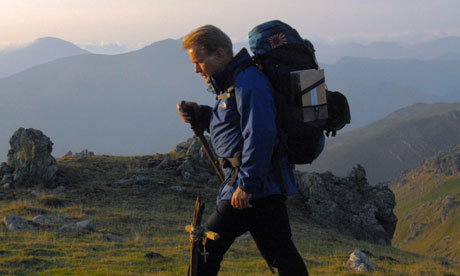
Journeys of self-discovery are clearly jolly good things, but do they have to be real-life treks? The movies would have us believe so. Recently, in accordance with long-standing big-screen practice, Eat Pray Love, Monsters, The Road and The Way Back have all thrust their protagonists toward varying degrees of enlightenment via cross-country peregrination. Just how the process is supposed to work isn't usually spelled out. At last, however, we're being offered what sounds like a definitive account.
The odyssey depicted in The Way is plainly intended to be unusually instructive. "On life's journey everyone loses their way," the trailer forewarns us, "but some of us find the courage to start again." The venture that's to make this possible isn't one of the merely casual or enforced excursions of less prescriptive films. It's full-scale participation in the 1,000-year-old, 500-mile-plus Camino de Santiago pilgrimage, on which millions have sought spiritual betterment.
There's a generational healing dimension that's mirrored in the partnering of Martin Sheen, the star, with his real-life son, Emilio Estevez, who both directs and plays his own fictional counterpart. As is often the case in such parables, it's the wise child who must teach his erring elder what's really what. So before Daniel departs for the Camino – he's to die in a tragic accident – he tips off his father, Tom, to the lesson he can learn only by completing his son's journey. So what is it? "You don't choose a life," apparently. "You live one."
In Daniel's case, living rather than choosing a life has meant chucking in his studies to tackle the Camino. Tom, however, admits that he's chosen his own life: shamefully, he's a well-to-do ophthalmologist with a golf habit. He must follow in his son's footsteps to discover why doing OK out of caring for the optically impaired has been a waste of existence.
On the trail he hooks up with a fat Dutch buffoon, a chippy Canadian chain-smoker and a loopy Irish writer. They walk up hills, meet lovable Latin folk, sleep in humble abodes, walk down dales and party with Gypsies. On the way they have their spats, but learn to bond. The result of all this is that Tom sees the light, abandons ophthalmology and apparently becomes a permanent long-haul tourist.
Unfortunately, it's not obvious why his hike would have had this effect, or why he or the world would be better off if it did. The Camino trappings are baroquely Catholic, but Tom is lapsed and various sages insist his impending epiphany will have nothing to do with religion. Sheen has tried to explicate. "We must surrender ourselves to our brokenness," he told an interviewer. "That's the beginning of community, and that's what this film is all about." Yet it remains unclear how Tom's burgeoning carbon footprint will enhance human togetherness.
The search for understanding of the human predicament may well look like a journey. So it's natural enough not just for film-makers, but also for the rest of us, to try to translate this quest into an actual trip. Yet travel isn't a sure-fire route to meaning; it's as likely to prove an escape from that irksome path. Maybe that's why we're so keen on it. If we really want to find ourselves, we might do better to forgo wanderlust and stay just where we are.
Horace observed: "They change the sky, not their soul, who run across the sea." Ralph Waldo Emerson offered: "Our minds travel when our bodies are forced to stay at home." Chesterton opined: "Travel narrows the mind ... to travel is to leave the inside and to draw dangerously near the outside."
Estevez has said that he based The Way on The Wizard of Oz. In that film, however, Dorothy's epic journey turns out to be a dream. When she wakes, she's relieved to be back in her own room, and promises she'll never leave again because what she's learned is that there's no place like home.
Journeys may suit the two-hour traffic of the screen. But perhaps we shouldn't expect them to take us beyond the yellow brick road.

